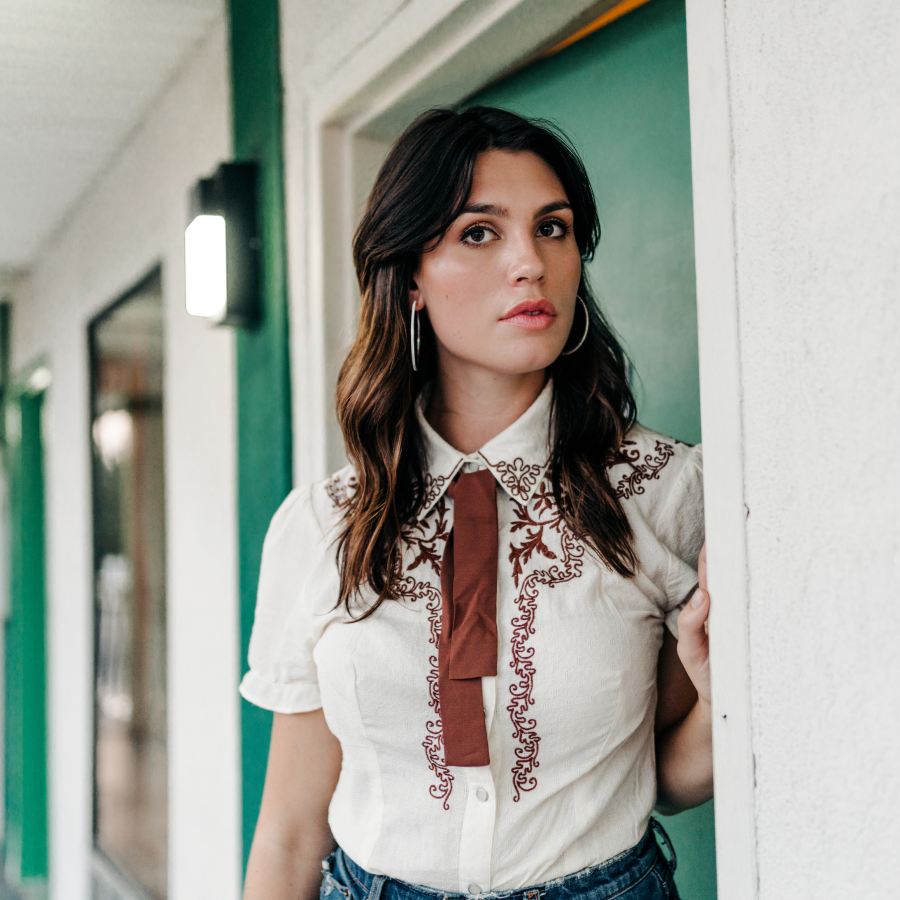Steeped in the tradition of country and folk music, with a distinctly contemporary, cinematic edge, Stefanie Joyce’s songs tell stories in images as much as sounds, weaving tightly crafted tales of sin, redemption, and everything in between. With a passion for storytelling, she counts songwriters such as Kris Kristofferson, Evan Felker (Turnpike Troubadours), Tyler Childers, Miranda Lambert, and Brandy Clark as influences. She grew up surrounded by mountain music and bluegrass; later, she fell in love with the lonesome swagger of Texas country and the red dirt scene; you will hear both these influences throughout her album.
What makes Stefanie most unique as an Americana artist, however, are her lyrics; her years spent penning songs for other artists and working as a Music Row songwriter give a distinctly Nashville clarity to her writing. But don’t let her music row experience fool you into thinking this album is a folksy take on feel-good radio music. The subject matter is dark; the characters in her songs are fallen, desperate, consumed with vice. Some find elusive moments of redemption, most do not.

“‘Presidio’ is a song about how we never really move past our brokeness; we just learn to live with it,” Joyce writes. The song is haunting, made the more so by Joyce’s keening chorus, carefully contained with a Nashville pop sensibility.
Who are some of your musical influences?
Turnpike Troubadours, Gillian Welch, John Prine, Brandy Clark for lyrics. Emmylou Harris and early Sturgill Simpson for vibe. I also study a lot of bluegrass and old time tunes.
Name a perfect song and tell us why you feel that way.
That’s hard! I think “Angel from Montgomery” comes close. It functions like a short story; it shows a snapshot of a woman in her kitchen wondering how the hell she got to where she is. The genius of John Prine’s best songs is that he never comes out and says she’s depressed and her husband is horrible; he just says “there’s flies in the kitchen, I can hear them buzzin, I ain’t done nothin’ since I woke up today.”
It’s very different from hook-based Nashville writing but it’s just as direct and cohesive. I think those are my favorite songs; they tell a story through details in an unexpected way without veering into poetry for the sake of poetry, or vagueness, as a lot of what constitutes “Americana” these days does.
“Mama’s Crying Long” by Rhiannon giddens functions in the same way. “Lucille” by Kenny Rogers (written by Albert Collins / Richard Penniman) does this well. I’m always going to be looking at lyrics when I consider a “great” song. For me, the best songs are those that tackle complex stories and dig into the grit of life.
My Music Row training has really made me appreciate songs with a clear intent; I want a song to be about one single thing and I want every line to write towards that. I want a song to be a cohesive, encapsulated world. But I don’t like cliche topics or sanitized takes on life, which is what dominates mainstream country music. The best songs for me strike a balance between cohesive Nashville-style writing and the language, subject matter, and acoustic grit of Americana.
Does your album have an overarching theme?
Sin, redemption, and everything in between. Snapshots of small town life.
Do you have any songwriting tips you can share?
Don’t wait to be inspired. Sit your ass down and try to tackle a song regardless of your mood. (Co-writing helps with this.) That way, you have the skills to properly “catch” a song when you are inspired.
Also, study great songs and try to figure out how they work. My first year in Nashville, I would write down the lyrics from a song I liked every day to examine how the language functioned.
Do you start off with the music or lyrics first?
I usually start with a lyrical idea and then try to see if I can get it to line up with a melodic vibe I’ve had kicking around.
Who would you love to collaborate with?
if I could write with Brandy Clark or Evan Felkner. That would be a dream come true. They are both living legends I would love to learn from.
